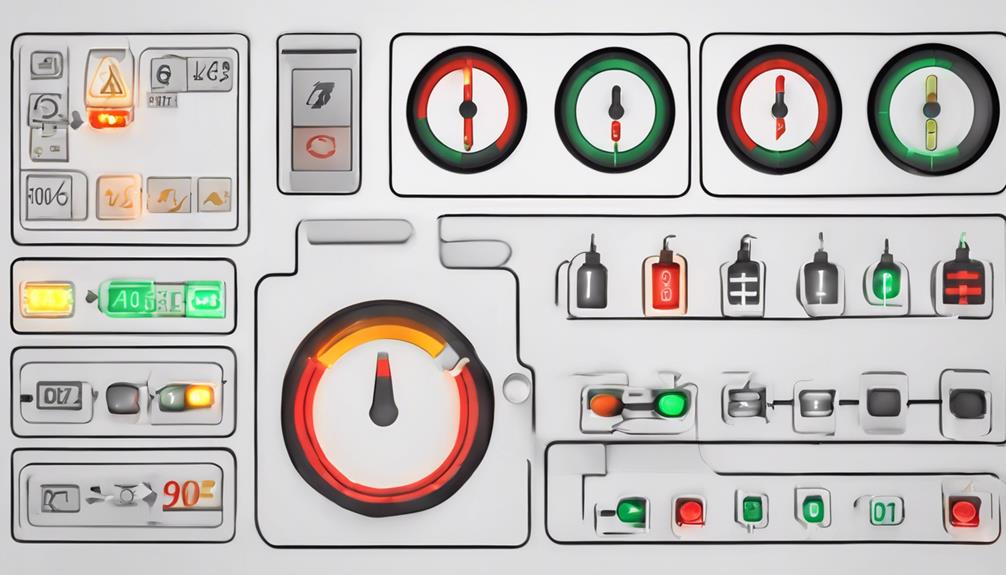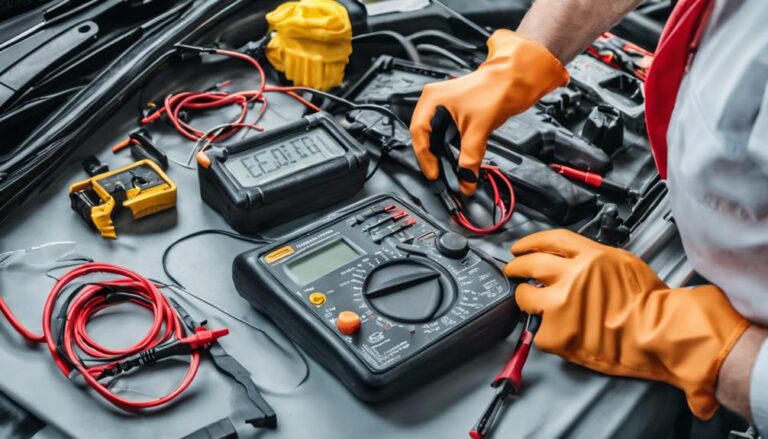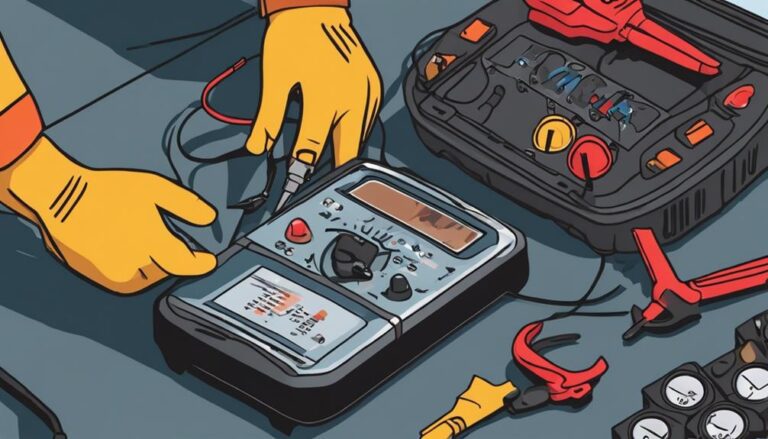Decoding Your Car's Battery Warning Lights: A Guide
Picture this:
You're cruising down the highway, enjoying the drive, when suddenly, a red battery warning light flashes on your dashboard. What does it mean, and should you be concerned?
Understanding these signals is crucial for your vehicle's health and your safety on the road.
Deciphering these warning lights could be the key to preventing a breakdown or more significant issues down the line. Stay tuned to unravel the mysteries behind your car's battery warning lights and ensure smooth travels ahead.
Key Takeaways
- Thorough inspection of electrical components is crucial for identifying causes of battery warning light activation.
- Symptoms of a failing battery include dimming headlights, flickering electronics, and voltage fluctuations.
- Testing battery health with a multimeter, load test, and terminal inspection is essential for maintenance.
- Consider professional battery replacement for accurate installation and testing, preventing future electrical problems.
Common Battery Warning Light Causes
When diagnosing common causes for battery warning light activation, a thorough inspection of the electrical components is crucial. Electrical system troubleshooting is key to identifying issues such as corroded battery cables, faulty wiring, loose connections, alternator problems, voltage regulator malfunctions, and power steering pump involvement.
Preventing battery light issues starts with regular maintenance. Ensure battery terminals are clean and free of corrosion to maintain a proper flow of electricity, preventing disruptions that could trigger the warning light. It's essential to check for any signs of wear or damage in the wiring and connections to avoid potential problems.
Symptoms of a Failing Battery
Dimming headlights and flickering electronics serve as early indicators of a failing battery. If you notice these signs, it may be time to consider the health of your battery. Here are some key symptoms to watch for:
- Battery Warning Light: The battery warning light on your dashboard could indicate potential charging system issues or problems with the battery itself.
- Corroded Connections: Corroded battery cables and terminals can disrupt the flow of electricity, triggering the battery warning light.
- Faulty Wiring: Loose connections or faulty wiring can interfere with the electrical flow, leading to the battery light coming on.
- Voltage Fluctuations: Keep an eye on voltage fluctuations, as irregularities in voltage levels can be a clear sign of battery issues.
Monitoring these symptoms and conducting regular battery diagnostics can help you stay ahead of potential battery problems. By being proactive and addressing any warning signs promptly, you can ensure your vehicle's electrical system stays in optimal condition.
Testing Your Car's Battery Health
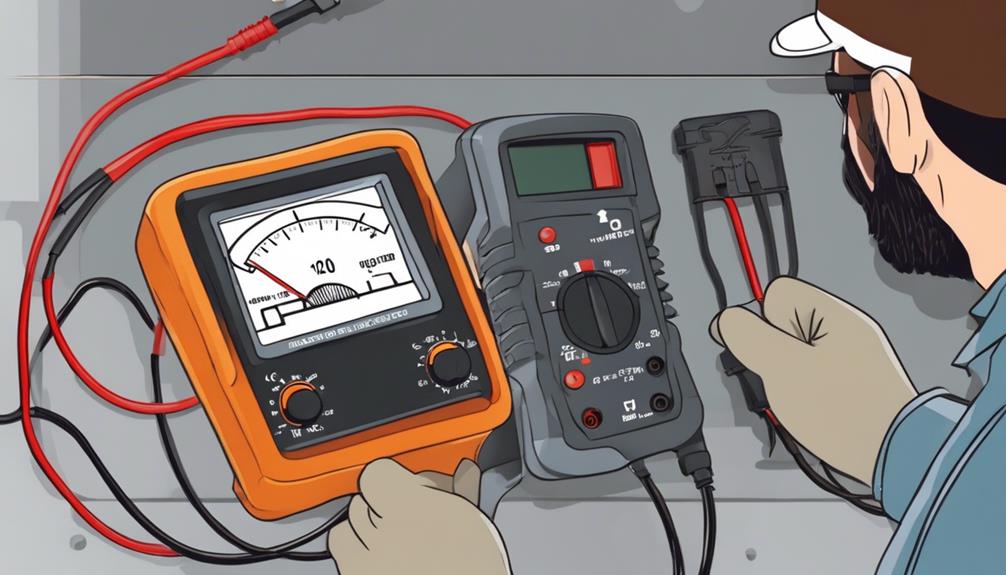
To assess your car's battery health, utilize a multimeter to measure the voltage, aiming for approximately 12.6 volts with the vehicle turned off. This will give you an indication of the battery's charge level.
Additionally, consider conducting a load test to check how well the battery holds a charge under load, ensuring it can handle the demands of starting your car. Inspect the battery terminals for any signs of corrosion or loose connections that could hinder its performance.
Regular maintenance is key to prolonging your battery's life; ensure the terminals are clean and secure. When charging your battery, follow proper methods to avoid overcharging, which can lead to damage. Remember that most car batteries last between 3-5 years, so keep track of its age.
If you notice dimming headlights or slow cranking, these are signs of a weak battery and indicate the need for professional assistance. Regular checks and following battery maintenance tips will help keep your car's battery in good condition.
Signs You Need a Battery Replacement
If you notice your vehicle's headlights dimming or electronics flickering, it may be time to consider a battery replacement. Here are four signs indicating the need for a battery replacement:
- Continuous Battery Warning Light: If the battery warning light stays lit on your dashboard, this is a clear indication of potential battery issues.
- Corroded Cables and Terminals: Corrosion on the battery cables and terminals can disrupt the flow of electricity, signaling the need for a battery replacement.
- Faulty Wiring or Loose Connections: Issues like faulty wiring or loose connections can trigger the battery warning light, necessitating a battery replacement.
- Involvement of Power Steering Pump: If the power steering pump is involved and the battery warning light comes on, it's a sign that a battery replacement may be necessary.
Ensure you pay attention to these signs, as they can help you proactively address battery problems before they escalate.
Regular battery diagnostics and monitoring voltage fluctuations can also aid in preventing unexpected breakdowns.
DIY Vs. Professional Battery Replacement
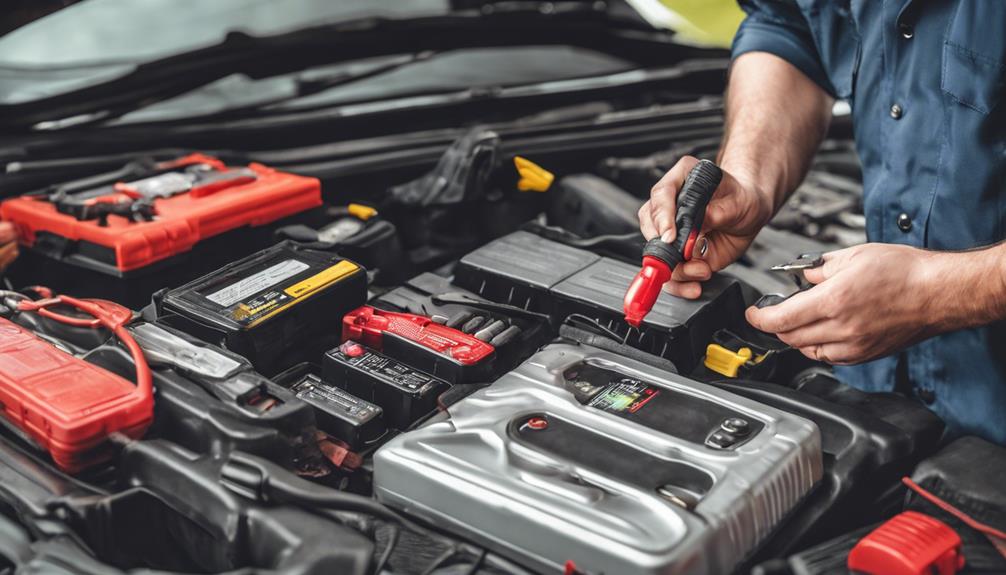
When considering whether to replace your car battery yourself or seek professional help, it's crucial to weigh the benefits and risks associated with each option.
DIY battery replacement can save you money upfront, as you won't incur labor costs. However, it requires proper tools and knowledge of your car's electrical system. If done incorrectly, it can lead to electrical system issues, affecting your vehicle's performance and potentially voiding the warranty if not done according to manufacturer specifications.
On the other hand, professional battery replacement ensures correct installation, preventing damage to the vehicle's electronics. Technicians have the expertise to test the battery and charging system for optimal performance, which can prolong the life of your battery and prevent future issues. The downside is the higher cost compared to a DIY approach.
Frequently Asked Questions
How Do You Read Car Warning Lights?
When reading car warning lights, pay attention to symbols and colors. Check your vehicle's manual for specific meanings. Don't assume, get it checked by a professional. Ignoring warning lights may lead to costly repairs or safety hazards.
What Do Car Battery Lights Mean?
Wondering what those car battery lights mean? Regular battery maintenance is vital for your vehicle's health. Dive into understanding your car's electrical systems to stay ahead of potential issues. Are you ready?
What Is the Battery Warning Symbol?
When you see the battery warning symbol on your dashboard, it's crucial to pay attention. Understanding voltage and battery diagnostics can help you address potential issues early on. Don't ignore this warning to prevent future electrical problems.
What Are the Dashboard Indicators or Warning Lights of a Bad Battery Alternator?
When your dashboard signals a bad battery or alternator, don't ignore it. Quick action can prevent costly repairs. Check for dimming lights, strange smells, or difficulty starting. Visit a mechanic for alternator diagnosis or battery replacement.
Conclusion
Congratulations! You've now mastered the art of decoding your car's battery warning lights. Remember, ignoring these warnings could lead to serious issues down the road.
So, next time a warning light pops up on your dashboard, don't just brush it off – take action to ensure your car keeps running smoothly.
Stay vigilant and keep those batteries charged for a smooth ride ahead!

